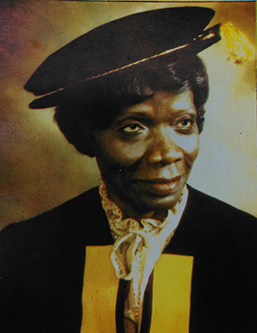
May 16, 2019, by Richard Bates
The First BME Nurse in the NHS – by Professor Lynn McDonald
In our latest guest blog, Professor Lynn McDonald, editor of the Collected Works of Florence Nightingale and co-founder of the Nightingale Society, outlines the little-known story of Kofoworola Abeni Pratt, the first black nurse to work in the NHS.
Mrs “Rola” Pratt was an outstanding nursing leader. When the Windrush Empire arrived in the U.K. in June 1948, Pratt was already at St Thomas’ Hospital blazing a trail for the many BME nurses who followed.
That black and minority ethnic nurses have made and continue to make an enormous contribution to the NHS is well known. But who was the first and how did it happen? In fact, the first is known and her story well documented, if hardly known: Kofoworola Abeni Pratt (1915-92), a Nigerian who trained at the Nightingale School, a deliberate choice because she identified with Florence Nightingale, its founder.
Pratt, like Nightingale, wanted to become a nurse, but her family, like Nightingale’s, disapproved. She instead became a school teacher and, while teaching, married a pharmacist who later trained in medicine in London, at St. Bart’s. In London, with Mrs Pratt still in Nigeria with their first son, he went to see the matron at St. Thomas’ to ask for her acceptance in the school. She agreed and Mrs Pratt began her training in 1946. When the National Health Service started (5 July 1948) she had passed the preliminary state examinations (she completed the final state exam the following year).
Qualifications: the record shows that Pratt was an exceptionally good student, obtaining 5 As and 2 Bs at St Thomas’. She next took certificates in midwifery (on a Royal College of Nursing scholarship), tropical diseases, and the ward sister’s course (on a Nightingale Fund scholarship). She later obtained the Administration Certificate. The matron’s report on her says that she “mixed well with her colleagues, with whom she is very popular. Colour has been no bar.” She never asked for any special favour on account of her young son. She had “a good sense of responsibility” and was “always honest and loyal.”
After her training, she nursed at St. Thomas’ and also the Evelina Children’s Hospital. Her second son was born in London, baptised at St Martin in the Fields Church. Both sons later got professional qualifications in London.
Pratt was encouraged by British nursing leaders to return to then pre-independence Nigeria to assist in getting professional nursing established there. University College Hospital, Ibadan, which had Nigeria’s first medical school, was the leading hospital. She began nursing there in 1954 and rose through posts of ward sister up to deputy matron and matron.
Racism: Pratt first encountered racism while nursing at St Thomas’ when a patient objected to her nursing him. The ward sister reported this to the matron. The patient was spoken to firmly and agreed to have her as his nurse. Pratt, a competent professional, looked after him well and he became friendly!
In Ibadan, a British ex-pat doctor objected to her becoming his ward sister (despite her having the requisite British qualifications), although he had asked for a new ward sister as his current one was inadequate. The matron, however, insisted and Pratt got the job. Before long, the doctor came to describe her as the best ward sister he had ever had, in the U.K. or Nigeria. They worked effectively as she rose to become matron. Dr Brown became Dean of Medicine, and fully supported her when she wanted to bring the School of Nursing into the University of Ibadan, which happened in 1965.
Pratt as a nursing leader: Pratt’s school in Ibadan was the first nurse training school in Nigeria and led to the creation of others, beginning in Lagos. Pratt was the leader, also, in the formation of PATNON, the Professional Association of Trained Nurses of Nigeria. She helped to found Nigerian Nurse and co-edited it for some years.
International work: Pratt won scholarships (Carnegie, Rockefeller and World Health Organisation) to travel and learn about nursing in other countries: Jamaica, the United States and Scandinavia. The next step was to give leadership in international organisations, beginning with the International Council of Nurses. She was Nigeria’s representative and became 3rd vice-president. She took part in an ICN delegation to the USSR.
Documentation: There is ample material on Pratt and her groundbreaking work, notably a biography by a Nigerian nurse, who later did a PhD at the Institute of Education and pursued a university career in England:
Justus Akinsaya, An African ‘Florence Nightingale’ (Ibadan: Vantage, 1987).
See also:
Lynn McDonald, Mary Seacole:The Making of the Myth (Toronto: Iguana Books, 2014), 230-31.
On her Nigerian and international work: “Kofoworola Abeni Pratt.” Int Nurs Rev 5(4) (October 1967) 7-11.
An obituary: “Kofoworola Abeni Pratt.” Nightingale Fellowship Journal, 27 January 1993.

An exemplary nurse with a good sense of duty. Her name is written in gold if not diamond. Your good works lives on.
[…] https://blogs.nottingham.ac.uk/florencenightingale/2019/05/16/the-first-bme-nurse-in-the-nhs-by-prof… […]